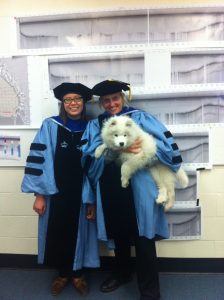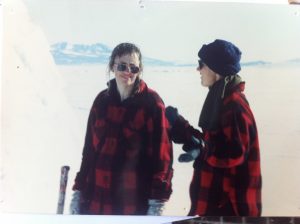August 25, 2017
Q&A with Dr. Robin Bell, Palisades Geophysical Institute/ Lamont Research Professor at Lamont-Doherty Earth Observatory of Columbia University
Posted by bwebster
Women’s Equality Day is August 26th! To celebrate, AGU will be highlighting several prominent women working in Earth and space science. We’ll be posting Q&A’s on The Bridge and to our various social media platforms including Twitter and Instagram!

This is a picture of Dr Winnie Chu now at Stanford who just completed her doctorate along with my Samoyed Puppy. Winnie gave a great defense talk but really wanted the puppy around for the party.
Today’s featured scientist is Dr. Robin Elizabeth Bell. Dr. Bell is Palisades Geophysical Institute/ Lamont Research Professor at Lamont-Doherty Earth Observatory of Columbia University. She received her B.A. in Geology and her MA, MPhil, PhD in Geophysics from Columbia University.
Who or what has inspired you to pursue your research?
When I learned there were stripes on the ocean floor that let you put the puzzle of the continents back together I decided physics was the way to discover things about the earth. I never looked back.
What is an obstacle you have had to overcome to get to your current position?
My current position is leading a research group studying the polar ice. There was no group at my institution studying ice when I started so it was really done from scratch. We had to figure out how to do it.
Did you have any important mentors in your career, and how did they impact you?
My best mentors have been my peer mentors. They make me laugh they make me cry they provide a sounding board for my ideas both good and bad. They have always been there for me.
What should be the future priorities for scientific research in the U.S.?

This is a picture of me with Carol Finn (USGS, former AGU President). We are at Snow School in 1990. She is so excited about her igloo and her hot cocoa that she did not notice how cold and wet I was. I was thinking about killing her… I did not. We are still friends.
We are very lucky as a species to have the knowledge to understand our home planet as a system from pole to pole. Future priorities must be to ensure this planet remains a habitable on now and in the future. The essential priorities include improving our knowledge of how change will occur in the future and develop technologies to move to a carbon free economy.
How can the U.S. ensure that it continues to play a leading role in scientific discovery?
Investing in basic research will ensure the US at the cutting edge of discovery from the sub-atomic scale to the planetary scale.
What discovery do you hope is made in your lifetime?
I hope we discover a carbon free means of travel so we can continue our global economy while preserving our planet.


